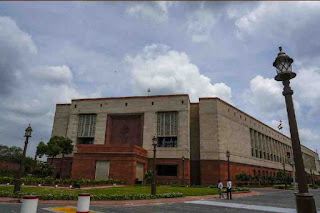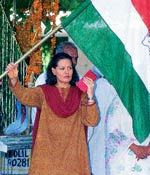Battlelines are drawn. Heated exchange of words and frequent pandemonium scenes and repeated adjournments will be the order of the day beginning July 21, Monday, when the much awaited Monsoon session of Parliament will get under way. Parliamentary Democracy is a serious business.
The people are the masters in democracy and occasionally they do approve of the vanishing tricks on the jokers and also occasional Tamashas.
The session comes close on the heels of Operation Sindoor. This was one of the most important epoch making episodes of our time. The treasury bench will as expected applaud the decisive military exercise that has left Pakisan leaking wounds and its sponsors - China and Turkey awe struck.
However, the opposition will be too busy to deprive the government taking credit. They have listed out all possible negativity including alleged intelligence failure for the Pahalgam tragedy.
There is no dearth of good orators in the ruling side. So point by point rebuttal to the opposition challenges and allegations will be on cards. The real debate is with regard the political approaches from two sides.
In the opposition camp; the Congress believes in the illusion of ever-greenness of Nehru-Gndhi dynasty tag. Three other major opposition parties are well smitted by this menace.
The DMK, Trinamool Congress and Samajwadi Party are not spared from this dynastic games. Together these parties have 186 members in Lok Sabha.
Congress - 99,
Samajwadi Party - 37
Trinamool Congress - 28
and DMK -22
The BJP alone has 240.
In the case of Congress, Rahul Gandhi and his sister Priyanka Gandhi Vadra - both are in Lok Sabha and mother Sonia Gandhi is in Rajya Sabha. Its articulate and brilliant debater Shashi Tharoor is now not in good books and all sorts of media speculation is on. Talent of Tharoor is today going against him as far as his stint with the grand old party (founded in 1885) is concerned.
The fact of the matter is dynastic tag is already subjected to the law of diminishing return. Dynasty is also a liability for Mamata Banerjee-led Trinamool and DMK.
With Samajwadi Party, former CM Mulayam Singh Yadav's son Akhilesh Yadav is the boss and his focus will be soon for the Uttar Pradesh where assembly elections are due by next 18-19 months.
In other words all these four principal opposition parties are charmed by the family domination only. No dynamic party can move forward if it refuses to go beyond the closed charmed circle.
These parties are out of reckoning in terms of power-play in the centre since 2014. The Congress is in power in few states while Trinamool and DMK have hold on to their ground in respective states of West Bengal and Tamil Nadu.
The Samajwadi Party was voted out from citadel of power in Lucknow in 2017 and in the centre, its last representative in the Union cabinet was Mulayam Singh as Defence Minister under H D Deve Gowda and I K Gujral -- 1997 and 1998.
In contrast, the metamorphosis of the BJP is worth mentioning. Of course, there is a common refrain that the party is highly centralised with Narendra Modi and Amit Shah running the show. This aspect has led to further debate on who would be next BJP president. The RSS has complicated things further by suggesting that politicians should retire on attaining 75 years. The Prime Minister will tur n 75 on Sept 17th this year.
These debates have been taken to another realm when Nihsikant Dubey, known for being close to the leadership, stating that without as the 'face', the BJP will not be able to win more than 150 seats in 2029.
One credible theory in circulation is the RSS is not giving its nod to a new president of BJP who will be 'close confidant and lieutenant' of the Modi-Shah duo.
But the BJP has encouraged coming of new faces. Some experiments have proved immensely successful.
The decision taken in 2017 to make Yogi Adityanath (a non-RSS man) as UP chief minister has fetched in dividends. Yogi ensured party's return to power in 2022 as well.
This is not altogether a new phenomenon. The party was successful in their planning with regard Modi for Gujarat and Shivraj Singh Chouhan in Madhya Pradesh. Speculation is also on whether Shivraj will be agreed upon both by Nagpur and New Delhi as the new party boss. Having transformed a 'BIMARU' tate Madhya Pradesh during his stint as Chief Minister between Nov 2005 and June 2025, Shivraj has brownie points in his favour.
While he may get the blessings of RSS; there could be a second thought in Nagpur as he may not confront the powerful Modi-Shah team.
Technically speaking Modi is not just first among equals in his cabinet. He is the Numero Uno as Jawaharlal Nehru was between 1950 (after Sardar Patel's death) and 1962. When it comes to BJP's decision making process - Modi is both the judge and jury.
But he has delegated power to Amit Shah, who is thus No. 2 in terms of power-play both within the government and the party.
To a large extent J P Nadda is responsible for giving so much space to Amit Shah; but that's how things have played out.
Talking about the past, one can point out that the PMO had become real power centre between 1969 and 1971 with P N Haksar as the fulcrum.
Under Modi, Babus are influential but no one is allowed to have any say (at least in the public perception) as deciding factor vis-a-vis BJP's game-plans.
Modi also introduced a new style. He has been directly interacting and directing Babus - that is civilian heads of various ministries.
The winner takes it all. The Modi-Shah duo is certainly successful electoral machine. PM Modi is also master vote catcher and his being there brought implementation of major agendas of Hindutva school of wisdom.
The RSS expansion also has been ensured in areas where the Sanghprivar fountainhead did not reach earlier.
ends








No comments:
Post a Comment